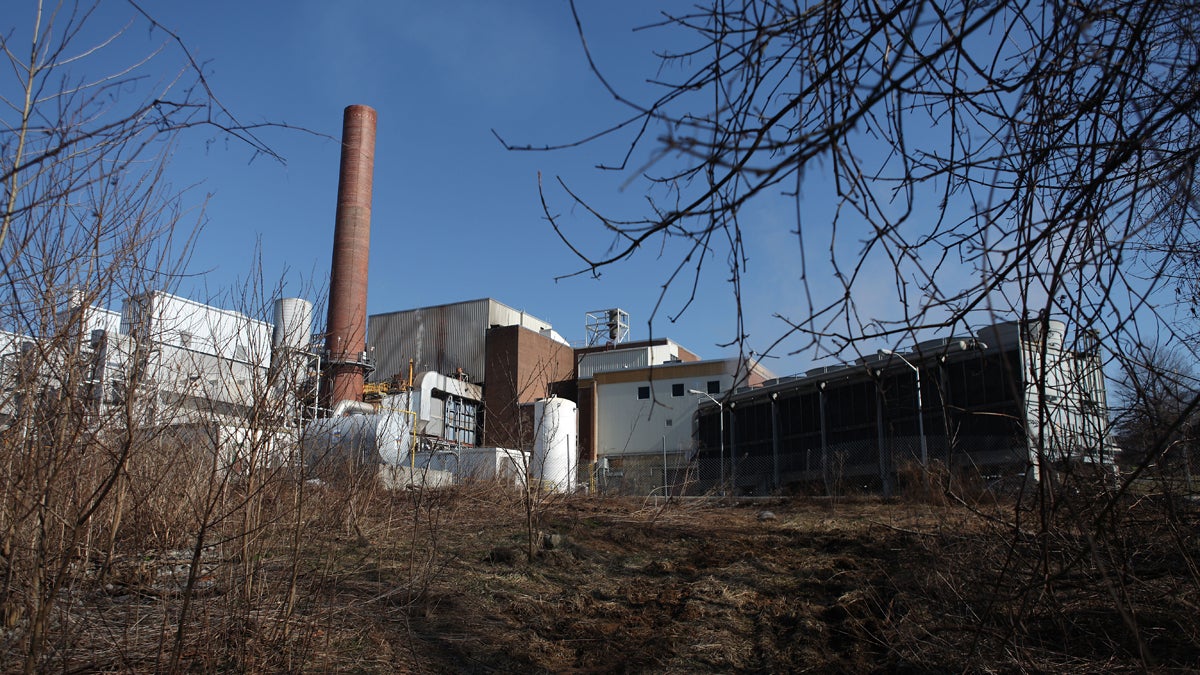Pennsylvania lawmakers renew push for more oversight of public borrowing

The Harrisburg Incinerator on South 19th Street, in Harrisburg, Pa. (AP Photo/Carolyn Kaster, File)
Some legislators think the Commonwealth should have stricter rules governing how local government units and public school districts borrow money.
Citing the capital city of Harrisburg’s debt crisis, they introduced four bills targeting the state’s Local Government Unit Debt Act, or LGUDA, in 2013.
They did it in ceremonial fashion with a news conference at the publicly-owned incinerator tied to more than half the municipality’s nearly $600 million obligation.
During the next seven months, the city negotiated a deal that prevented formal bankruptcy – but legislation intended to prevent similar scenarios never made it to the floor during that time. Or the following year.
So the group of state Senate Local Government Committee members will try again.
Their legislation will be reintroduced next week, according to the committee’s executive director and chairman John Eichelberger’s chief of staff Lee Derr.
Minority chairman Rob Teplitz, D-Dauphin; state Sen. John Blake, D-Lackawanna; and state Sen. Mike Folmer, R-Lebanon; also are sponsoring bills.
Copies of the new versions weren’t immediately available.
Derr says recent tweaks include eliminating provisions that would require local public agencies to submit intended bond deals 60 days ahead of time to the state Department of Community & Economic Development.
He says the changes attempt to address concerns that possible market fluctuations could be costly or negate the prospective deal entirely, wasting efforts.
Two bills enhance state oversight.
Eichelberger’s Senate Bill 340 would require more vetting of prospective financial deals by the state Department of Community & Economic Development.
Blake is sponsoring another bill (SB341) that would subject suspected LGUDA violations to the scrutiny of the state Ethics Commission, according to a statement released Wednesday by the committee. The bill would consider confirmed transgressions to be Public Official and Employee Ethics Act violations, which fall under the purview of the commission, the district attorney or state Attorney General’s office, according to the statement.
No one has been held accountable thus far by the multiple agencies with jurisdiction over the investigation into how Harrisburg amassed so much debt. The Securities and Exchange Commission issued sanctions against the municipality as a whole, but didn’t name names.
Critics accused Dauphin County District Attorney Ed Marsico of sitting on the case before turning over the matter to the state Attorney General’s office, which confirmed an investigation over a year ago and convened a grand jury shortly thereafter.
Two bills deal with interest-rate swaps
Pennsylvania’s schools and local government units have issued more than $17 billion of public debt through interest-rate swaps.
Some say they’re complex- but potentially beneficial – financial instruments; others say they amount to gambling with public money.
The first group appears to have won the debate, as the legislation originally proposing a ban now contains regulations and extends those rules to Philadelphia, which isn’t subject to LGUDA.When legislators tried to ban swaps, public finance experts protested – including Philadelphia City Treasurer Nancy Winkler and Jay Wenger, former vice-president of Central Dauphin School District’s Board of School Directors. They argued the risky financial instruments could, through proper management, benefit taxpayers.
Public agencies backing other agencies’ debt
Senate Bill 340 also would prohibit local public agencies from backing other public agencies’ debt (unless the arrangement is part of a state-devised recovery plan), and from accepting payment for doing so. A municipal guarantee is a promise by one public agency to cover debt repayments if they can’t be paid by another, borrowing agency. Akin to bond insurance, the guarantee typically secures a lower interest rate.
Dauphin County, for example, guaranteed bonds issued by The Harrisburg Authority to pay for an ill-fated incinerator retrofit – which ultimately accounted for more than half the city’s formerly problematic debt load. The county was paid, as a bond insurer would be.
And it made good on its promise, which ended up costing county taxpayers millions before bondholders were repaid through new debt issued in December 2013 by the Lancaster County Solid Waste Management Authority and the Pennsylvania Economic Development Financing Authority.
LCSWMA now owns the city’s incinerator; PEDFA is in a public-private partnership with city parking operator SP-Plus Municipal Services – and Standard Parking affiliate – and investor Guggenheim Securities.
Some of the new debt is backed by Dauphin County and Assured Guaranty Municipal Corp.
AGM was paid, the county was not – and both signed releases from any potential criminal liability tied to past city borrowings.
WHYY is your source for fact-based, in-depth journalism and information. As a nonprofit organization, we rely on financial support from readers like you. Please give today.



